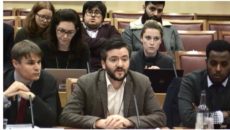
In the past five years, at least seven Humanist Students societies have been subjected to banning, censure, or disruption at universities around the UK, said Humanists UK Chief Executive Andrew Copson, addressing the Joint Committee on Human Rights in the UK Parliament on Wednesday afternoon. The session was convened to gather evidence on whether the right to free expression was being curtailed on university campuses, and Humanists UK gave evidence alongside representatives of the religion think tank Theos, the Union of Jewish Students, the Federation of Student Islamic Societies, and two students with an interest in this area.
Mr Copson told the committee that in every instance where students unions were responsible for the censoring of humanist materials and satire on campus, the Humanist Students societies involved worked with Humanists UK and sometimes lawyers to achieve a favourable resolution. Often the universities involved – including Reading, South Bank, UCL, and LSE – were quick to intervene and reverse the decisions. But in other cases, such as instances at Queen Mary and Goldsmiths in London, talks had to be abandoned due to aggression from religious student hardliners, including death threats from student Islamists.
Mr Copson’s evidence to the committee explored the difficulty Humanist Students and other groups face when organising events. For example, a typical protocol for approving an event on university grounds will involve a students union leader determining, based on a quick Google search, whether or not a speaker is ‘controversial’, and then whether to prohibit or allow the event. Another difficulty is that when costs arise as a result of security for controversial speakers, either the students union or the university will agree to pay, which can prove a source of tension within the university or within the student community. A further tension will arise when students unions, which have a responsibility to mitigate risk to their own reputations, are put in conflict with universities’ clear public duties to champion free speech.
In a broad-ranging discussion with much agreement from all involved, a clear picture was presented of the muddled framework students face: guidelines from multiple sources, including prohibitions on religious harassment, responsibilities under the Prevent anti-terror program, requirements of the Charity Commission, the Public Sector Equality Duty, and a prevailing media narrative about student censorship which heaps unfairly high levels of scrutiny on students who make mistakes or organise controversial events. In this context, it was clear to see why students have been becoming, as some data suggests, more risk-averse and more likely to self-censor.
Mr Copson’s proposal to the committee was to get a national body such as the Equality and Human Rights Commission to draw up an overarching piece of guidance which could draw together all the existing legislative and regulatory requirements into one place, making it easier for students and those responsible for safeguarding their events to avoid lapsing into undue censorship. This paper would carry a strong presumption on the side of allowing controversial speech, whilst specifying those limited circumstances where the right to free expression is legally restricted (such as around incitement to violence). One benefit of a specific briefing for students and universities would be to create a common understanding between students, student societies, students unions, and the universities themselves, illustrated by clear case studies.
Drawing on the experience of generations of student activists in the humanist movement, Mr Copson strongly recommended that the committee consider using real examples that could help students more effectively guarantee – and understand – the right to free expression. For example, a case study which illustrated that ridicule, satire, or criticism of religious or political ideas should always be permissible in a free society would have gone a long way towards preventing the kinds of disruptions that many Humanist Students societies have been subjected to in recent years.
Notes
For further comment or information contact Richy Thompson, Director of Public Affairs and Policy at richy@humanists.uk or 020 7324 3072.
Read more about Humanists UK’s campaign work on free speech on campuses: https://humanists.uk/campaigns/human-rights-and-equality/freedom-of-speech-and-expression/free-speech-on-campus/
At Humanists UK, we advance free thinking and promote humanism to create a tolerant society where rational thinking and kindness prevail. Our work brings non-religious people together to develop their own views, helping people be happier and more fulfilled in the one life we have. Through our ceremonies, education services, and community and campaigning work, we strive to create a fair and equal society for all.
Humanist Students recently announced the offer of free Humanists UK membership to those currently enrolled in higher education: https://humanists.uk/2017/09/19/humanists-uk-and-humanist-students-announce-free-membership-for-students/
Humanists UK recently changed its name from the British Humanist Association: https://humanists.uk/2017/05/22/bha-becomes-humanists-uk/
